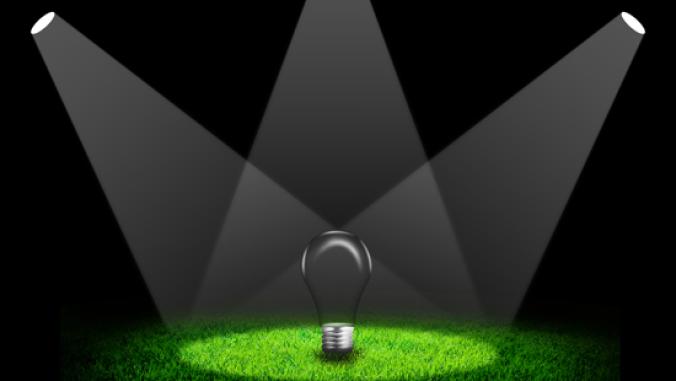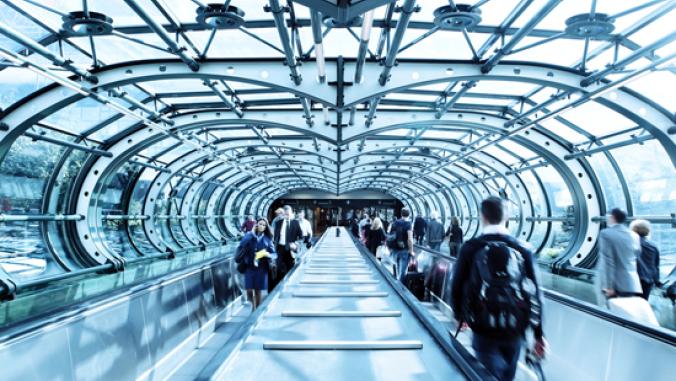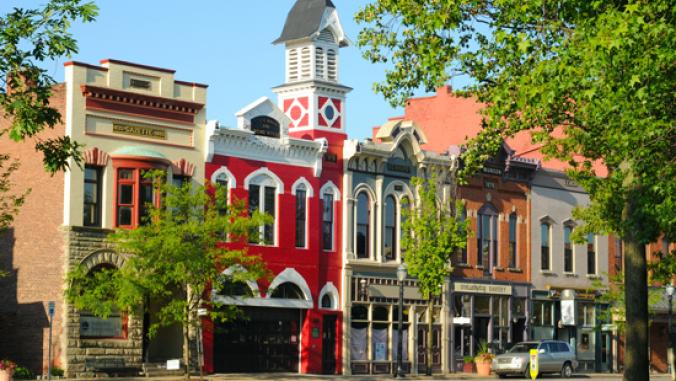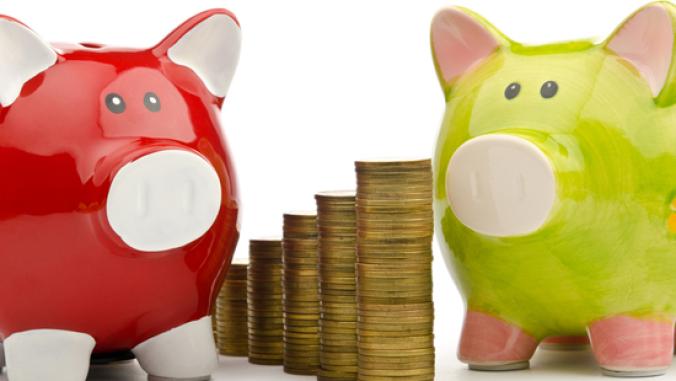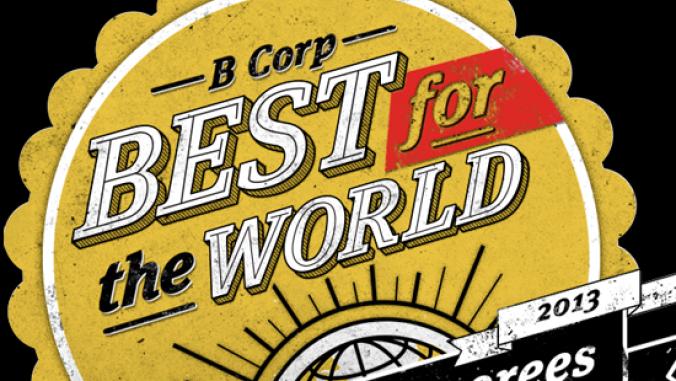How Does a Media Company Take Sustainability to Prime Time?
<p>In this wide-ranging interview, NBC Universal's Beth Colleton describes what it looks like when a diversified media company makes a commitment to sustainability.</p>

[Editor's Note: Last month, the GreenBiz editorial staff had a briefing with Beth Colleton, the vice president of NBC Universal's "Green is Universal" project. Over the course of a wide-ranging interview, we talked about the company's "Green Week," the larger sustainability efforts of the company, and what happens with green behind the scenes. What follows is a transcript of that interview, which has been edited for clarity and length; we have also combined questions by all the editors together as coming from "GreenBiz."]
NBCUniversal, which was purchased by Comcast at the end of January, is the umbrella company for more than 40 on-air and online brands, from the NBC network to Oxygen, as well as Universal Studios and the Universal Studios theme parks and resorts around the world. In 2007, NBC launched its "Green Week," a week-long celebration of environmental issues that took place during its shows, at its theme parks, and throughout the company's offices.
GreenBiz: How much of NBC Universal's sustainability efforts are about messaging to the audience? How much of it is internal? Looking at the first part of that, how do you shape the various messages for an MSNBC vs. Oxygen?
 Beth Colleton: I think the key to it is that we, the Green is Universal team, don't try to do that. We work in a solid partnership with the producers, editors, and the staff at each of those entities because they know their audience best.
Beth Colleton: I think the key to it is that we, the Green is Universal team, don't try to do that. We work in a solid partnership with the producers, editors, and the staff at each of those entities because they know their audience best.
So, while we might be able to warn them on information about the environment and where the issues currently stand, they ultimately are the folks that craft that message in a way that'll have real traction and be applicable to the audience in which they speak to every day. I think that goes to a bigger core driver for NBC Universal, which is we don't have a structure that has Green is Universal in one silo trying to drive all this change single-handedly through the business.
We are cross-organizational. We work across every division of the company but we also believe that the solutions will come from the workforce, that it's about educating them, engaging them and also recognizing them for the work that they do to advance sustainability and get it into our DNA.
GB: Other than messaging to viewers, how much of Green is Universal's work has to do with NBC's own internal efforts? How much work do you do with employees? How much work do you do with facilities, things like that?
BC: We do a lot. At certain points we're talking about marketing, consumer messaging. Otherwise we're talking about kilowatts, energy consumption and government regulation in the sector. So we really do run the gamut here and are committed to driving sustainability 365 days a year.
The other thing on the operational end that we've been very sensitive to is that our business is a little bit different. The creative process, the production business is unique every single time. No movie, TV show or episode is the same as the one prior. So we are very focused on educating the staff and the employees within those functions. It's almost like teaching a man to fish so they learn the areas they should be targeting and then when we step out of the picture they can create solutions in an ongoing basis.
GB: How do you track that? That is one of our big questions: What does Green Week mean for the rest of the year? Are there things that you have in place to manage how progress happens, or to check in on what's working?
BC: Yes, we do. I think one of the places we get to on tracking is we need a baseline for that and baseline isn't necessarily measurement right now. The first thing is what makes certain operations or best practices sustainable. So we've actually developed a whole series of instruction manuals. We have a green TV production guide, a green film production guide, a sourcing guide, etc; about seven of them in total
So the first thing we've done is create a baseline for, "What are the targets we're going after? What are the activities we're trying to implement across the board?" From that, the different parts of our business have been able set goals. For example, our television division that produces both our shows that are on network and on cable, out of the green productions guide, set a series of green goals.
The first year there were 17 goals. Last year they added several more that they can implement across their slate of production. Then from that we can get some numeric measurements, successes, and also learnings, because sometimes the activity not going well provides us with great learnings.
GB: Can you give us some examples of both successes and things that you had to adjust?
BC: Yes, I can even give you a simple one. There's such a great conversation around biodiesel, and down at our theme parks in Orlando, all of the park vehicles, boats, cars, and otherwise run on biodiesel. It's very successful down there. So when we explored it for our TV production, we realized why many shows do it -- because it works for that location; but biodiesel freezes in the mid-30 degrees.
So for a show like Law and Order: SVU, which films in Northern New Jersey, in the winter the temperature will drop, so we had to adjust our approach and couldn't necessarily say, "Across the board, we as a company are only going to use this type of fuel," because it just wasn't practical, or even viable.
GB: Was there a process to come up with an alternative, or is it simply just, "Well we just won't use biofuels for Law and Order: SVU?
BC: No, they can use it at different times of the year. I think that's the importance of educating your workforce to come up with solutions as these opportunities open up to, just as you're saying. If we were merely to give them an instruction and it didn't work for them they'd just opt out and say, "That doesn't work." But our focus is more on educating and making our employees the key drivers of change. I think a great example of what has gone well, really well, is our Home Entertainment group.
GB: What's changed since 2007 -- what have you added to Green Week? What have you decided didn't work? How has Green Week changed, and how have your overall initiatives changed?
BC: Green Week continues to get bigger and better. We get more excited every year because we've maintained what we've done from the beginning but then added to it in a lot of creative ways. We've extended a lot of consumer marketing promotions that in addition to delivering our message on air, we've moved to a lot of online. We've engaged millions of users through social media. We've done events and activities in the theme parks. So, as far as Green Week itself it just gets larger and larger.
An example of that would be two social media promotion we did during this Green Week. There was an activity called "Make Green Count," which was a Facebook promotion where we activated 26 of our brands to each come up with a single behavior that collectively can really add up to make great change. That could be using energy-efficient light bulbs or commuting to work, using reusable water bottles rather than single use.
Each one of those activities was assigned a point. We first set a goal of 10,000 points, which would trigger a donation to the Nature Conservancy. The response was so strong and, to be honest, so quick that within a few days, we'd already hit our initial goal. By the end of it we had reached 1.5 million pledge points over Green Week, which resulted in $30,000 in donations to the Nature Conservancy, but more importantly, it hopefully triggered some behavioral changes that the audience of our brands will sustain long after Green Week ends.
GB: What about the NBCU employees, as opposed to the audience? How have they taken to it?
BC: To be honest, the enthusiasm from our employee base has been absolutely incredible from day one. There was a list of messages and people knocking on the door saying, "I have an idea. How can we make it happen?" So we have been capitalizing on that enthusiasm and their expertise for several years, but we've taken it a step further here. As we said, our goal is to not just educate and engage our employees but actually recognize them because they're part of the solutions in driving sustainability into this company's fabric.
So this year we launched something called Eco-Ovation, which is an awards recognition program where employees around the company both stateside and abroad gain recognition for the work they do to advance sustainability.
There were two different categories. One is what we call an "Eco-Ambassador." Those are those folks who just generally champion a sensitivity towards the environment. They might tell their group, "Let's recycle more. Let's bring in reusable coffee mugs rather than using paper all the time." But even though it's less formal and probably less measurable, we think that creating that type of environment is important for the company.
Our other levels are what we call "Eco-Innovators." We have Eco-Innovator teams and Eco-Innovator individuals, and these are people who actually study the way their areas function and look to implement sustainable practices into the core way they do business.
This can be our production group changing the way they dub tapes and eliminating a massive amount of plastic that not only do we consume, but then ultimately will end up in a landfill. Our transportation group has changed the way they run our fleet cars, not only hybrids but reducing the number of vehicles on the road so we lessen our footprint there.
We run the program twice a year. We have already recognized more than 200 employees in five different countries in 24 different business divisions. So, it really is the greatest example of how the change is being driven from not only every part of the business but every part of the business in every part of the world.
GB: What has the toughest sell been, whether it's for your employees, whether it's for your audience. What has been an unexpected stumbling block?
BC: Even though it sounds like the PR answer here, it's true: The biggest stumbling block hasn't been with us selling it. It's literally having enough hands on deck and hours in the day to get everything done because, not only does a company as diverse as this offer up so many opportunities to implement sustainable practices but the enthusiasm and ideas coming from around the company, from our workforce, is never-ending and that's a good thing.
So, I think the biggest challenge really is prioritizing and figuring out where the highest and best use is and where we can get the most traction quickly. But I really don't think we've had resistance from trying to sell someone on the importance of sustainability.
One flip side to this is that, because people are so generally enthusiastic about this, sometimes we do need to control expectations of what's viable or not. A lot of people hear a lot of information about different energy technologies, whether it's solar or otherwise or they see something about recycling or waste reduction and really want to go after it.
So, sometimes we need to work with them to explain what the real science or numbers are behind it, or what the real returns are and make sure that it is the approach for us because I think the sector is evolving so quickly that sometimes something was effective and worked three years ago, but it's been replaced by something better currently.
GB: What would you say is the best employee idea that you've come across so far?
BC: That's a tough one, because, again, there's so many different ways that the company is activating around sustainability. But one of the most effective, strategic ideas that came from not just one employee but an entire team of them is from our theme parks, particularly in Orlando.
What they realized is the value of the collective: For four years now, five years now, the whole division has chosen a single priority to focus on when it comes to the environment.
Then throughout that whole year everybody, from HR to engineers to marketers to others, really does a deep dive on how to advance that at Universal Orlando. One year it was water. One year it was waste management. Another was energy. But for example, in 2009 the Orlando theme park saved enough energy at Universal Orlando to fully power Wet and Wild, their other theme park for the whole year.
That wouldn't have happened unless they had agreed on a shared goal and a shared problem-solving approach.
And it has not only produced some great numeric returns as far as benefits to the environment, but it's created a sense of camaraderie around sustainability because different parts of the company down there can talk with each other and join forces.

